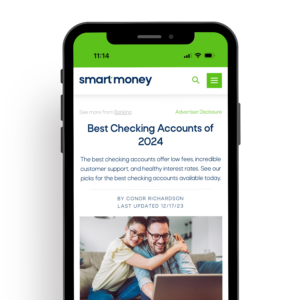Takeaways
- Credit cards are financial products that allow you to make purchases without cash.
- Choosing the right credit card involves balancing rewards programs with lending terms.
- Applying for a credit card involves submitting personal, financial, and income data.
- Financial institutions review credit reports to determine eligibility for credit products.
- Credit cards can lead to overconsumption, which can negatively impact your credit score.
Some of the links in this article are from advertising partners of Smart Money, which does not influence our evaluations or recommendations. We work to provide you with accurate and reliable information. Our opinions are our own.
Operating without a credit card in today’s modern economy is almost impossible. Almost everyone uses a credit card for day-to-day transactions. They have become so ubiquitous that a recent study showed over 82 percent of U.S. adults have at least one credit card [1]. With so many options in the marketplace, selecting the best credit card for your financial situation can feel overwhelming.
However, a credit card provides a frictionless form of payment to make purchasing online and in-person easy. Before you apply for a credit card, you should think about building your credit score, vetting the best rewards programs, and budgeting for credit card payments.
With the rise of mobile payments, virtual credit cards, and evolving fintech, understanding the ins and outs of applying for a credit card will help shape your financial future for the better.
What is a Credit Card?
A credit card is a financial product that allows you to borrow money from banks, credit unions, and other financial institutions. While credit cards can provide you with more financial flexibility, there are limitations to how much you can borrow per card, which is called your credit limit. Your credit limit can range from card to card and depends primarily on your credit history and debt-to-income ratio. In addition to extending a line of credit, these programs offer excellent services and financial benefits, like purchase protection, fraud prevention, and travel and discount rewards.
Adding a credit card to your financial mix does come with added responsibilities. With a credit card, you will need to manage your spending appropriately to avoid overspending, going into consumer debt, or negatively affecting your credit score. Before formally applying for a credit card, make sure to take the time to understand the credit card’s terms, such as annual percentage rate (APR), payment due dates, and fees.
5 Steps to Open a Credit Card
Opening a credit card only takes a matter of minutes, so make sure to take the time to research the best credit card for you. Here are five steps to help you apply for your credit card:
1. Choose a Credit Card
There are many different cards to choose from, each with its limitations and perks. Finance professionals recommend optimizing what is important to you. For example, if you love to travel, you can focus on getting the best travel rewards card.
Research and compare different credit cards to determine which best suit your lifestyle and financial goals.
Here are several types of credit cards to consider:
- Cash-Back Credit Cards
- Rewards Credit Cards
- Travel Credit Cards
- Secured Credit Cards
- 0% APY Transfer Credit Cards
- Store Specific Credit Cards
- Student Credit Cards
- Business Credit Cards
Get Smart With Your Money
Fresh weekly articles delivered straight to your inbox.
Enter your name and email for free tips and tricks.

2. Submit Application
Once you have chosen the right card for you, it is time to start the application process. To submit your credit card application, you may have to fill out a form online or in person at a branch location.
You may be asked to provide accurate information. Some of the typical information credit card providers collect to make an assessment:
- First and Last Name
- Address
- Employment Status
- Social Security Number
- Annual Income
- Current Debts (e.g., mortgage, auto loan)
Before clicking “submit,” double-check your application to ensure there are no errors. Once you submit, the credit card provider will conduct a search on your credit history, check your credit score and assess your credit limit.
Learn More -> What is a FICO Score?
3. Receive Approval
After you have submitted your application, the credit card provider will take the next step to review your application. This is when they consolidate all the information you provided, filter it through their credit card criteria, and determine your eligibility.
The credit card issuer will then notify you they have approved your application, and you will receive a confirmation email and letter. The overall approval process usually only takes one to several business days. During this process, your lender will determine your eligibility for other bonuses and set your credit limit.
For some credit cards, you will immediately be notified that you meet their requirements. From that point, they might even provide you with access to your credit card’s online portal and send you a virtual card until your physical card arrives in the mail.
Your application could be denied. This usually happens when you have a low credit score, no credit score at all, or a history of delinquencies. Not all credit cards are created equal. For more premium cards, you might have to have a credit score above 800, which can take time to build. The best thing to do is be confident that you have a high probability of getting accepted to a credit card program before they run a hard credit check.
4. Get Your Credit Card
If you have been approved, you will receive your physical credit card by mail, or you might be instructed to pick it up in person at a local branch office. Your credit card will be accompanied by an information packet featuring all the unique aspects of your credit card and associated rewards program.
Follow all necessary prompts and instructions to activate your credit card properly. Note your credit limit , APR, and any other card benefits that you want to take advantage of. You can monitor your charges through your lender’s website or app for easy access.
5. Use Your Credit Card
Once activated, you can start using your credit card right away. Of course, you will need to stay below your approved credit limit. It is a smart money move to keep your credit utilization low and regularly monitor your credit card spending.
Credit cards are often considered a double-edged sword because they make buying goods and services seamless, which can increase your propensity to spend. Be mindful and keep your spending in check. It is essential to have a budgeting process in place so that you make on-time credit card payments. On time payments are a critical variable in calculating your FICO and VantageScore and need to be taken seriously to boost your credit score.
You may want to set up recurring automatic payments with your credit card issuer to avoid missing a minimum payment. This can be a hassle-free way to remain debt free and accrue credit card rewards.
Learn More -> Debt Payment: Snowball vs. Avalanche Method
How to Boost Your Credit Score
Maintaining a good credit score is essential financial hygiene for getting access to favorable auto loans, mortgages, and credit card terms. If you don’t have a credit history or are considered to have poor credit, you may not get approved for a credit card. Here are some strategies to help improve your credit score:
Pay Bills on Time
Timely payment of your monthly bills, including credit card payments, is vital to demonstrate responsible and consistent financial behavior. At the end of the day, lenders want to know they are lending capital to someone who will pay back their principal and interest.
Learn More -> Are Credit Card Cash Advances a Great Idea?
Late payments can significantly impact your credit score and may even stay on your report for up to seven years [2]. Avoiding late fees and negative marks on your credit report can also help. You may want to set up payment reminders or automatic payments for your bills, so you never miss a due date.
Keep Credit Utilization Low
Try to keep your credit card balances low relative to your credit limits. To accomplish this, you need to be mindful of your spending and aware of how close you are to reaching your credit limit monthly.
Get Smart -> 8 Steps to Pay Off Credit Card Debt Fast
High credit utilization ratios can negatively impact your credit score. Personal finance experts argue you should use less than 30% of your available credit. To do this, you can adopt a habit of using your debit card and credit card in tandem. Using your debit card will help ensure you don’t over rely on your credit card while simultaneously using your credit card on other purchases to build credit.
Monitor Your Credit Report
You should regularly review your credit report from all three nationwide credit bureaus (Equifax, Experian, and TransUnion) to check for errors or discrepancies that could potentially harm your credit score.
You are entitled to get one free credit report from each of the three bureaus annually [3]. You can do this by visiting Annual Credit Report. Once you receive your reports, review them and dispute any inaccuracies quickly so your credit information is up-to-date and accurate. Using these free credit reports to monitor your creditworthiness is a smart money move.
Limit New Credit Applications
Avoid opening numerous credit cards or new lines of credit within a short period. Applying for multiple credit cards can indicate financial distress to potential lenders and temporarily lower your credit score. Instead of opening a new line of credit, focus on building positive credit within your existing accounts.
Need more strategies? Read more -> Increase Your Credit Score by 100 Points Quickly
Smart Summary
Applying for a credit card is a major financial decision. When used wisely, a credit card can be a valuable financial tool. However, you need to ensure your budget allows for credit card payments and that you regularly monitor your account balance, credit score, and credit report. Take advantage of the free tools banks and credit unions offer to help manage your credit card. Credit cards can be tedious to manage, but don’t forget to enjoy the free rewards program points to treat yourself occasionally.
(1) Government Accountability Office. Credit Cards: Pandemic Assistance Likely Helped Reduce Balances, and Credit Terms Varied Among Demographic Groups. Last Accessed April 10, 2024.
(2) Federal Reserve. Credit Reports and Credit Scores. Last Accessed April 10, 2024.
(3) Federal Trade Commission. Free Credit Reports. Last Accessed April 10, 2024.









